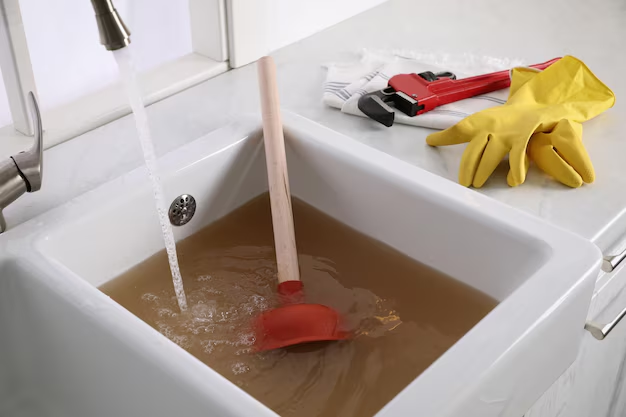Clogged drains are a common problem in many homes. Whether it’s your kitchen sink, bathroom drain, or shower, a blockage can stop water from flowing and cause many problems. Luckily, cleaning your drains doesn’t have to be complicated. There are simple and effective ways to get your drains clean and keep them working correctly. In this article, we will share the best drain cleaning methods that are easy for everyone to use.

Why Drain Cleaning Is Important
Drains get clogged because of food, hair, soap, grease, and other waste that goes down them. Over time, these things build up and block the pipes. When this happens, water can’t flow properly and might return to your sink, tub, or shower. Not only is this messy, but it can also cause bad smells or water damage. Regular drain cleaning is essential to keep your pipes clear and avoid these problems.
1. Baking Soda and Vinegar: A Simple Natural Solution
One of the best ways to clean a drain is by using ingredients you already have in your kitchen: baking soda and vinegar. This is a natural, safe, and eco-friendly method to clean your pipes. The fizzy reaction from the vinegar and baking soda helps to break down dirt and grease that causes clogs. It is an excellent method for minor blockages.
How to Use It:
- Pour about half a cup of baking soda down the drain.
- Add half a cup of white vinegar to the drain.
- Cover the drain with a cloth or a stopper and let the mixture sit for about 15 minutes.
- After 15 minutes, pour hot water down the drain to clean it.
This method is easy to do and works well for most drains. However, if the clog is too big, you should try something else.
2. Enzymatic Drain Cleaners: Safe and Effective
Enzymatic drain cleaners are another excellent option for cleaning your drains. These cleaners use natural bacteria and enzymes to break down the waste that causes clogs, such as food, grease, and hair. They are safe and won’t harm your pipes or the environment. You can use enzymatic drain cleaners regularly to keep your drains fresh and clear.
How They Work:
The bacteria and enzymes in these cleaners feed on organic waste inside your pipes. They break down the waste and help prevent your pipes from getting clogged. Enzymatic cleaners work slowly, so they won’t damage your plumbing and are gentle on your pipes.
How to Use It:
- Pour the enzymatic cleaner down the drain according to the instructions on the bottle.
- Let it sit for several hours or overnight.
- After it sits, flush the drain with warm water to remove any remaining waste.
An enzymatic cleaner once a month is a good way to keep your drains clear and prevent future blockages.
3. The Plunger: A Handy Tool for Small Clogs
The plunger is a classic tool for clearing clogs. It is simple to use and works well for minor sink, tub, or toilet blockages. The plunger creates pressure inside the drain, pushing the clog out of the way and restoring normal flow.
How to Use a Plunger:
- First, ensure enough water is in the sink or tub to cover the plunger cup.
- Place the plunger over the drain, making a tight seal.
- Push down hard and pull up quickly, repeating the motion several times.
- Remove the plunger after plunging for a minute and see if the water drains properly.
If the water drains quickly, the clog is gone! If it is still there, try plunging again or using another method.
4. Drain Snakes: Reaching Deep into the Pipes
Sometimes, a clog in the pipes is more profound and can’t be reached with a plunger. In these cases, a drain snake (also called an auger) can be very helpful. A drain snake is a long, flexible tool that can break up or pull out tough clogs farther down the drain.
How to Use a Drain Snake:
- Insert the end of the drain snake into the drain.
- Turn the handle to move the snake more deeply into the pipe.
- Keep turning until you feel resistance or the snake hits the clog.
- Once the snake has reached the blockage, turn it until the clog breaks apart or comes loose.
- Slowly pull the snake out of the drain, flushing the pipe with water.
Drain snakes are great for breaking through stubborn clogs. They can also grab and pull out hair or objects stuck deep in your pipes.
5. Preventing Clogs: Keep Your Drains Clean
The best way to deal with clogged drains is to prevent them from happening in the first place. Regular maintenance and good habits help keep your drains clear and working correctly. Here are some easy tips to prevent clogs:
Use Drain Screens:
Drain screens are small mesh covers that you can place over your drains to catch hair, food, and other debris before they go down the drain. These are especially helpful in the kitchen and bathroom. They’re easy to use and can help you avoid blockages in the future.
Don’t Pour Grease Down the Drain:
Grease and oil from cooking should never be poured down the drain. When these liquids cool, they can harden and create blockages in your pipes. Instead, pour the grease into a container and throw it in the trash.
Be Careful What You Flush:
Only flush toilet paper and human waste. Items like wipes, cotton balls, and sanitary products don’t break down in water and can get stuck in the pipes. These items can cause big clogs and lead to expensive repairs.
Rinse with Hot Water:
Once a week, pour a pot of boiling water down your drains. This helps wash away grease, soap scum, and food particles that can start to build up and cause clogs. It’s an easy way to keep your drains clean and free-flowing.
6. Commercial Drain Cleaners: Use with Caution
Try a commercial drain cleaner if your drain is clogged and nothing else works. These products contain strong chemicals that can break down tough clogs, but they should be used carefully. Overusing chemical drain cleaners can damage your pipes, so only use them when needed.
How to Use a Commercial Drain Cleaner:
- Carefully follow the instructions on the product.
- Pour the cleaner down the drain and wait for the recommended time.
- After waiting, flush the drain with warm water to remove any leftover cleaner and debris.
While these products work fast, they can be harsh on your pipes. If you use a commercial cleaner, use it sparingly and only for severe blockages.
7. Call a Professional Plumber If You Need Help
Sometimes, even the best DIY methods won’t fix a clog. If you’ve tried everything and the drain is still blocked, it might be time to call a plumber. Professional plumbers have the tools and experience to handle tough clogs and plumbing problems.
A plumber can also check your pipes for damage, like cracks or tree roots, that might be causing the clog. If your drains are constantly backing up, a plumber can find the source of the problem and fix it for you.
Conclusion
Keeping your drains clean and clear is essential for maintaining a healthy home. Regular drain cleaning can help prevent clogs, bad smells, and other plumbing problems. You can keep your drains working well by using simple methods like baking soda and vinegar, enzymatic cleaners, and a plunger. A drain snake or commercial cleaner might be needed for more challenging blockages. Don’t forget to follow good habits like using drain screens, avoiding grease, and flushing only toilet paper to prevent clogs from forming in the first place.
If you ever encounter a clog that you can’t fix, don’t hesitate to call a professional plumber for help. They can ensure that your drains are clean and your plumbing is in good shape.
Contact us today to learn more about how to keep your drains clear and your home running smoothly!
